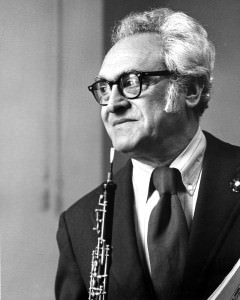New biography of oboist Robert Bloom
 Robert Bloom (1908-1994), one of the foremost oboists of his time and a former member of the Yale School of Music faculty, is the subject of a new biography. Robert Bloom: The Story of a Working Musician brings together essays, correspondence, reviews, anecdotes and more. It also incorporates Bloom's book on pedagogy dictated in 1975-1976: The Oboe, A Musical Instrument, as well as a disc of two chapters, one on reed-making and one a discography.
Robert Bloom (1908-1994), one of the foremost oboists of his time and a former member of the Yale School of Music faculty, is the subject of a new biography. Robert Bloom: The Story of a Working Musician brings together essays, correspondence, reviews, anecdotes and more. It also incorporates Bloom's book on pedagogy dictated in 1975-1976: The Oboe, A Musical Instrument, as well as a disc of two chapters, one on reed-making and one a discography.
The book jacket reads:
Often hailed as one of last performers of the Golden Era of classical music in America, a “grand, grand artiste” in the words of Pablo Casals, called “caro” by Arturo Toscanini, and favorite of conductors ranging from Leopold Stokowski to Igor Stravinsky to Robert Shaw, the legendary oboist Robert Bloom (1908-1994) left behind a treasure of inspiration as well as practical advice for the aspiring oboist.
Concert artist, composer, teacher, conductor, and editor of eighteenth-century music, Bloom was lauded by Philip Nelson, Dean of the Yale University School of Music, as a “consummate musician, oboist (and one-time cellist), cabinet maker, exceptional chef, lively pedagogue, raconteur extraordinaire, world traveler, and a 'gentleman for all seasons,'” one of the most admirable and likable champions of the 20th century. His biography is the first entered in the Grove Dictionary of Music and Musicians for an American-born oboist.
Robert Bloom's contributions have been intelligently gathered into a reader by Sara Lambert Bloom, a distinguished oboist, teacher, and scholar in her own right, who enjoyed a unique twenty-eight-year-long association with Bloom, first as his pupil, then as his spouse. Daniel Stolper, the prominent American oboist and pedagogue, has written, “Her erudition and burning commitment to this project shine through on every page . . . her prose often reads like poetry.”
Augmenting Bloom's unique and passionately rendered oboe pedagogy are documents giving his collegiate curriculum and preferred repertoire, his published and unpublished essays, his complete discography, selected correspondence and reviews, anecdotes from milestone events during his long and distinguished career, and excerpts from transcripts of interviews in which some of America's most prominent musicians discuss with him the art, the politics of the art, and musical and career highlights of the man “generally considered to be one of the greatest oboists of his generation and perhaps of all time.” --New Haven Register, March 1980
Calling Bloom's playing “cynosure,” brilliant enough to navigate by, Bernard Jacobson, program annotator and musicologist of the Philadelphia Orchestra and Artistic Director of the Residentie Orkest, The Hague, considers Bloom “a player of phenomenal gifts, not merely technical, though in that sphere he can have had few rivals, but in the fields of musicianship, of expressivity, and also--a salutary revelation in these days when we think we are the first generation to have discovered the truth about Baroque style--of taste in the interpretation and embellishment of eighteenth-century texts.” Bloom's pioneering work as a founding member of the Bach Aria Group, which he joined in 1946 at the invitation of the most revered American-born Bach scholar, William H. Scheide, is documented with excerpts from Sara Lambert Bloom's book (in progress) A Time For Bach: The Story of the Bach Aria Group (1946-1996).
Robert Bloom: The Story of a Working Musician is available from www.rdgwoodwinds.com.





